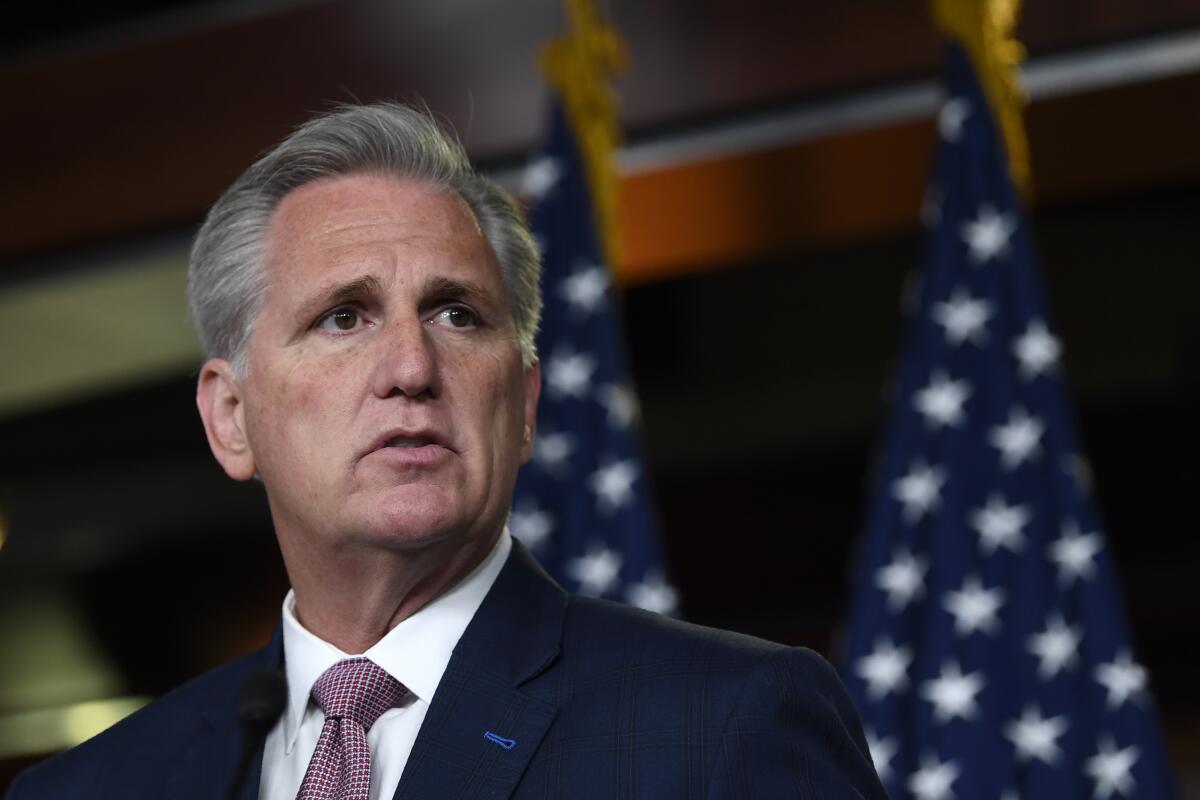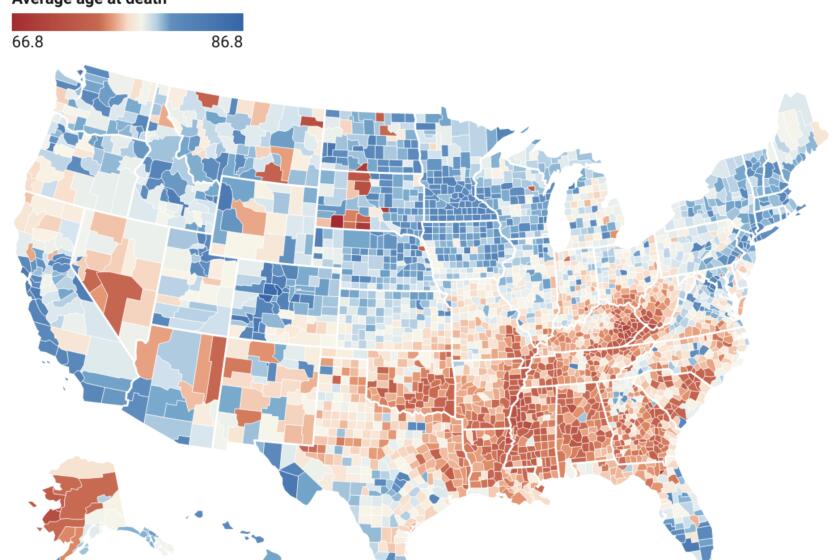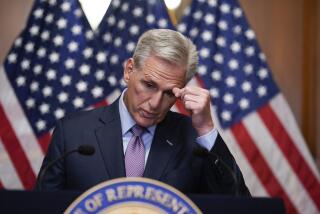Column: The GOP’s debt ceiling proposal bundles every bad policy idea into one noxious package

The idea of imposing work requirements on Medicaid recipients has a long and distinguished history. Distinguished, that is, by pointlessness and failure.
Healthcare experts and economists have long argued that work requirements achieve nothing but threatening thousands of people with the loss of their health benefits, don’t increase employment, are expensive to administer and are utterly unnecessary.
They’re correct on all counts. So of course House Speaker Kevin McCarthy (R-Bakersfield) has made the idea a centerpiece of his package of conditions for increasing the federal debt ceiling by $1.5 trillion through next March.
The same old trickle-down dressed up in MAGA clothing.
— President Biden’s description of the GOP’s debt ceiling proposal
McCarthy dubbed the package, unveiled April 19, the Limit, Save, Grow Act of 2023 and said it would, among other things, “lift Americans out of poverty.”
One can only assume that this is some sort of a gag. The GOP proposal would gut Medicaid and food stamp eligibility for millions of Americans, including 21 million Medicaid enrollees alone, according to the Department of Health and Human Services. It would turn the clock back on efforts to wean the U.S. from fossil fuels and prepare for the next inevitable pandemic.
Get the latest from Michael Hiltzik
Commentary on economics and more from a Pulitzer Prize winner.
You may occasionally receive promotional content from the Los Angeles Times.
It would increase the burden on people struggling with student debt and throttle an untold number of nondefense programs such as anti-pollution enforcement and consumer protection. It would roll back tax enforcement, giving the green light to tax evasion by the rich.
It is, in short, a one-stop shop for every chuckleheaded idea that Republicans have cooked up to undermine the public interest over the decades.
For a marker on how bad it is, consider that the Committee for a Responsible Federal Budget, which carries forward the fiscal campaign against ordinary Americans originally funded by the late private equity billionaire Peter G. Peterson, labels it “a reasonable proposal” and “a serious package of savings.”
It’s also dead on arrival. There’s no way that the Biden White House or the Senate Democratic majority would contemplate passing the thing.
At 320 pages, McCarthy’s bill is too long to cover in exhaustive detail, so let’s focus on a few of its more cynical and egregious provisions.
The debt ceiling, being wielded by the ignorant children of the House GOP, is the stupidest feature of federal fiscal policy.
But first, let’s dispense with the lie at the heart of the debt ceiling fight, which is that the ceiling is a rational and effective check on federal spending. In fact, it’s the most infantile feature of federal fiscal policy. McCarthy repeated this lie in introducing his bill: “If you gave your child a credit card and they kept maxing out the limit, you wouldn’t blindly raise the limit,” he said. “You’d change their behavior.”
With these words, McCarthy told on himself. The “behavior” at hand is Congress’ willingness to pass spending bills and cut federal revenues through tax cuts.
Congress is the child with the credit card; refusing to raise the debt ceiling to accommodate its own spending is tantamount to refusing to pay the bill when it comes due. In the household context, that refusal will land a person in Bankruptcy Court; when Congress refuses to pay its bills by refusing to raise the debt limit, the consequences could be a sharp rise in interest rates on debt and a crashed economy.
Now to the particulars. In general terms, the act rolls back nondefense spending to the level of fiscal 2022 and allows it to grow by no more than 1% a year. That’s not a “limit,” but a formula for increasingly draconian cuts in nondefense programs, because the annual increases won’t accommodate inflation or population growth.
By some estimates, that would result in a real reduction of as much as 58% in affected programs over 10 years; the Congressional Budget Office has estimated that under current law and projected inflation rates, the budget for those programs would naturally rise by about 26% in that time frame. Obviously, the reduction in services would be severe.
Under the guise of deficit reduction, the Republican bill takes aim at Biden administration initiatives that the GOP was unable to defeat on the floors of Congress or by making a credible appeal to voters.
It would rescind President Biden’s plan to give student loan borrowers relief of up to $20,000 on their debt and expand income-driven payment plans, which limit repayments to a percentage of borrowers’ income, cap interest rates at 5% and forgive outstanding balances after one or two decades of payments.
McCarthy slanders this program as “a giveaway for the wealthy.” The truth is that the Congressional Budget Office estimates that 95% of borrowers eligible for debt relief have incomes of $125,000 or less and two-thirds were recipients of federal Pell Grants, which go to low-income students.
McCarthy must think that mischaracterizing the program will allow him to look like a working-class hero by canceling it. He’s wrong. It only makes him look like a liar.
The real giveaway to the wealthy in McCarthy’s plan is his repeal of Biden’s augmented budget for the Internal Revenue Service. The Inflation Reduction Act, which Biden signed in August, allocated $80 billion in new funding for the IRS over 10 years.
Why does the IRS focus its enforcement capabilities on the poorest families?
McCarthy repeated the canard that the money would pay for an “army of 87,000 IRS agents.” Not so. The new hires — 87,000 over 10 years — include customer service representatives and technicians, as well as enforcement agents. As the Wall Street Journal observed, they would help make up for an estimated 50,000 retirements expected over that period.
Some of the money would indeed pay for better pursuit of tax cheats. McCarthy’s proposal to repeal the budget increase even led the Committee for a Responsible Federal Budget to a moment of clarity: It estimated that the repeal would worsen the federal deficit by $100 billion over a decade.
Through the Limit, Save, Grow Act, the House GOP would march blindly into a future likely to bite Americans where they live if it remains unaddressed. The act would claw back unspent COVID-19 relief funds, which are estimated to come to only about $100 billion.
McCarthy cited Biden’s agreement that the pandemic emergency is over. But if he thinks that humanity is, therefore, immunized against the next dangerous microbe, Mother Nature undoubtedly has a few surprises in store for him. Whatever funds are lying fallow should be used to prepare for the next challenge to public health, not to make the GOP’s wealthy patrons richer.
The act also pretends that global warming doesn’t exist. So it would repeal the Inflation Reduction Act’s incentives for renewable energy, including electric vehicle manufacturing, wind, solar and nuclear energy production credits, reportedly at the insistence of the most extreme right-wing members of McCarthy’s precarious House majority.
What’s notably missing from a measure advertised as a deficit reduction proposal is any hint of increasing federal revenues, say by repealing the 2017 Republican tax cuts, which heavily favored the wealthy and blew a hole in the budget estimated at $1.5 trillion over a decade. That’s the clearest indication that Biden was correct when he ridiculed the proposal Tuesday in a speech launching his campaign for reelection. He called it “the same old trickle-down dressed up in MAGA clothing.”
That brings us back to where we started, with work requirements for Medicaid and the Supplemental Nutrition Assistance Program (SNAP, or food stamps).
The record shows that these requirements are disastrous for beneficiaries, which may be the goal, since their underlying motivation is punitive. They became especially popular under Trump, whose Health and Human Services Department gleefully approved work requirements for Medicaid despite clear evidence that they were illegal.
After decades of increasing longevity, Americans are facing shorter life spans than their predecessors and their rich-country peers. In states where Republicans set the agenda, it’s even worse.
How did that work out? In Arkansas, the only state that was able to implement work requirements before a federal judge blocked them, 18,000 enrollees lost their coverage over the two years the rules were in effect.
A study team from Harvard’s School of Public Health found that among the disenrolled, 50% reported “serious problems paying off medical debt,” 56% delayed care because of its cost and 64% delayed taking medications because of their cost.
“We found no evidence that the policy succeeded in its stated goal of promoting work,” the researchers wrote, “and instead found substantial evidence of harm to healthcare coverage and access.”
The failure to increase employment wasn’t surprising: More than 95% of the target population was already working or was exempt. But the process to establish that their working hours met the rules was so complicated that thousands lost their coverage because of confusion.
As for SNAP, research indicates that work requirements reduce participation in the program by more than half. The rules fall disproportionately on homeless people and those unable to work for reasons that have nothing to do with laziness, despite the impression among Republicans and conservatives that those who seek government assistance are just layabouts and malingerers.
Nevertheless, McCarthy’s proposal would raise the exemption threshold for the work requirements to those age 56, from the current 50.
So let’s see the Limit, Save, Grow Act for what it is: not a deficit reduction proposal but an attempt to take the U.S. economy as a hostage to a right-wing effort to undo almost every initiative crafted over the last two years to make life better and healthier for ordinary Americans.
The feckless speaker accuses Biden and the Democrats of “playing partisan political games” by refusing to negotiate with him over the debt ceiling. But there’s nothing in his plan except partisan political games. Unfortunately, the future of the U.S. economy hangs in the balance.
More to Read
Get the latest from Michael Hiltzik
Commentary on economics and more from a Pulitzer Prize winner.
You may occasionally receive promotional content from the Los Angeles Times.














